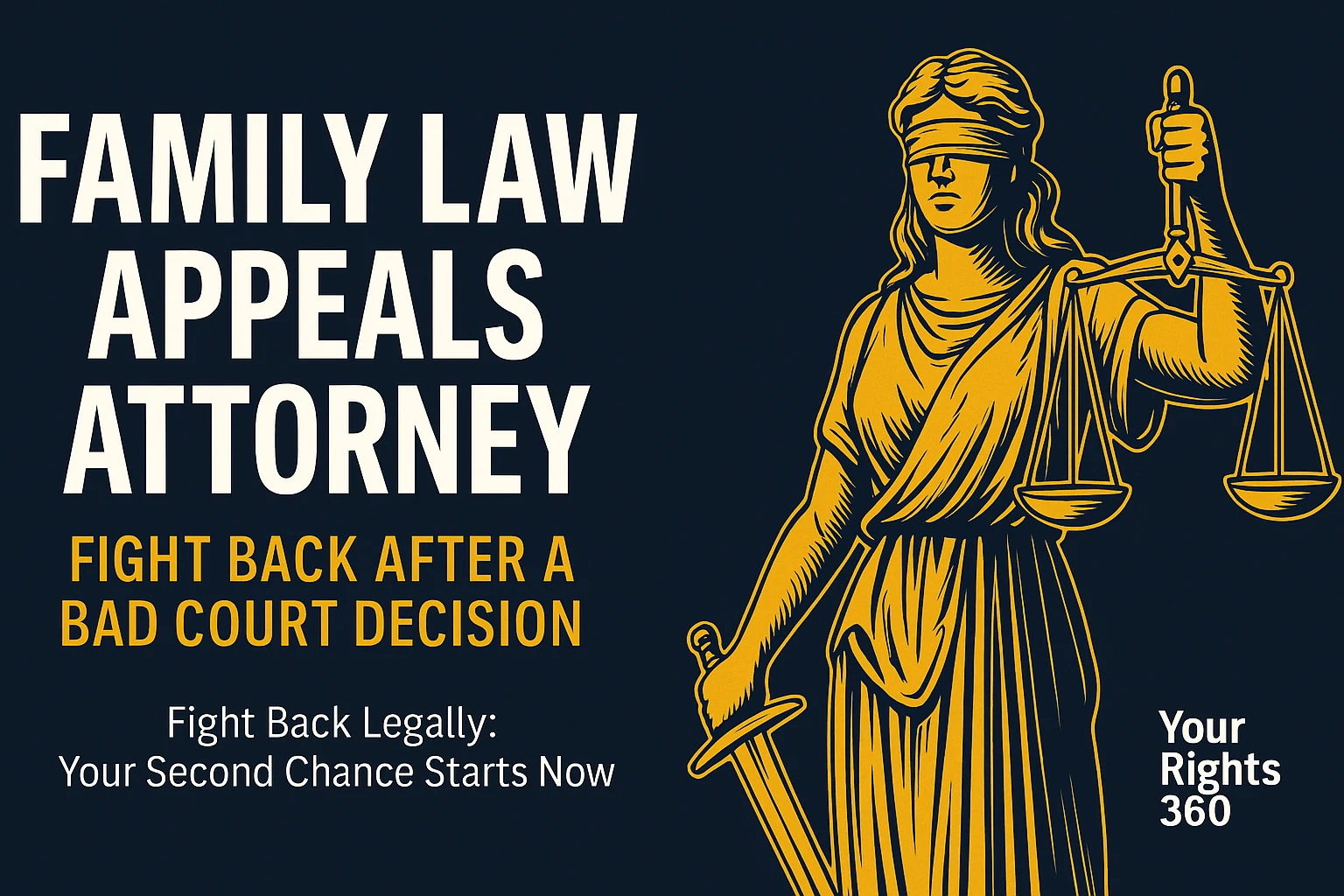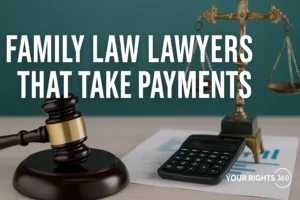Family court shapes your future. A judge may decide where your child lives, how much support you pay, or who keeps the home. These rulings affect your life for years. But judges do not always get it right. Sometimes they miss key facts. Sometimes they misread the law.
A wrong decision can hurt you and your family. Many people feel stuck. Some lose hope. Others accept the pain because they think nothing can change. But the law gives you one more chance. That chance is an appeal.
An appeal takes your case to a higher court. You do not tell your story again. You do not show new evidence. You point out what went wrong in court. If the higher court agrees, it can undo the bad ruling or order a new hearing.
Appeals are not simple. They follow strict rules. Every step matters. A family law appeals attorney knows how to follow those steps. This article shows how that lawyer works and how they help protect your rights when the court fails you.
What Is a Family Law Appeal?
A family law appeal asks a higher court to check a lower court’s final decision. It starts after the judge gives a final order. You cannot appeal just because the result feels unfair. You must show that the judge made a legal mistake that changed the outcome.
This step goes to a court above the one that handled your case. That court is often called the Court of Appeals. It does not take new evidence. It does not hold a new trial. It reviews the case record. It reads written briefs from both sides. Then it decides if the lower court followed the law.
Many family law cases go to appeal. These include divorce orders, child custody, support disputes, or protective rulings. Each type has strict rules. The court sets a short deadline to file. If you miss it, you may lose your right to challenge the result.
Appeals are not like trials. They need special skills. An appeals lawyer studies court records. They write clear legal arguments. They use past court decisions to support your case. A trial lawyer may not know how to do this. That is why you need someone who handles appeals often.
What a Family Law Appeals Attorney Does
A family law appeals attorney steps in after the trial ends. Their job is to fix legal errors made during that trial. These lawyers read every part of the court record. They look at what the judge said, how the evidence was used, and what arguments were allowed or denied.
They do not start from scratch. They use what happened in court to show that the ruling was flawed. That could include misreading the law, ignoring evidence, or showing bias. These errors must be serious enough to change the outcome of the case.
An appeals lawyer writes legal briefs. These are detailed documents that explain your side of the case to the appellate court. The lawyer also may appear at a hearing to explain the issues in person. This is called oral argument. Judges often ask tough questions at this step.
Your lawyer must follow strict court rules. The appeal must be filed on time. The brief must meet page limits and follow the format rules. Judges expect clear and respectful writing. They will not fix grammar or legal mistakes for you. A good lawyer knows how to get it right the first time.
When to Hire a Family Law Appeals Lawyer
You should not wait too long after a bad ruling. Time matters in an appeal. In most states, you only have 30 to 60 days to file your notice of appeal. If you miss that deadline, you likely lose your right to appeal forever.
Some people wait and try to fix things with the same judge. That rarely works if the judge made a legal error. Others try to go back to court later, but most rulings are final unless appealed. Do not waste time or hope. If you feel the decision was unfair, talk to an appeals lawyer quickly.
A lawyer can tell you if your case has a good chance on appeal. Not every case does. Sometimes the judge makes a decision that follows the law, even if you disagree. Other times, the judge crosses a line. Your lawyer will help you understand the difference.
It also helps if your trial lawyer and appeals lawyer can work together. Trial lawyers know the facts. Appeals lawyers know the law. Together, they give you the best chance to win on appeal and protect your rights.
Common Reasons to Appeal a Family Court Decision
Courts can make mistakes. Here are a few of the most common legal errors that lead to appeals:
Misuse of Discretion: Judges have wide power in family cases. But they must use that power fairly. If a judge uses wrong facts or shows bias, it may be abuse of discretion.
Wrong Law Applied: Sometimes the judge uses the wrong legal rule. For example, the court might use an outdated standard for child custody or spousal support.
Ignoring Key Evidence: A judge must consider all valid evidence. If the court skips key facts or refuses to allow important testimony, that may be grounds for appeal.
Lack of Findings: In many cases, the judge must explain their decision with written findings. If those are missing or vague, you may have a strong appeal.
Violation of Rights: If your due process rights were denied—such as the right to speak, to present evidence, or to a fair hearing—you may have legal grounds to appeal.
A family law appeals attorney will know how to identify these issues and raise them in the best way before the court.
Related Post: Family Law Public Defender
What to Expect During the Appeal Process
An appeal does not happen fast. You must prepare for a process that could take several months or more than a year. First, your lawyer will file a notice of appeal. Then the court gathers the record from your original case.
Next, your lawyer writes the opening brief. This is the main document that explains the errors in the lower court’s decision. The other side then files a response brief. After that, your lawyer can reply again with a final brief.
Sometimes the court schedules an oral argument. Your lawyer speaks to the judges and answers their questions. Other times, the court decides based only on the written briefs.
After all steps are done, the judges make a ruling. They may affirm the lower court’s decision, reverse it, or send it back for a new hearing. That final result becomes the law in your case.
Why You Should Choose the Right Appeals Attorney
Not every lawyer can handle an appeal. It takes a special set of skills. You need someone who knows how to write clear legal arguments and who understands the court’s strict rules.
Look for someone who focuses on family law appeals. Ask about their past cases. See if they have handled appeals like yours. A good appeals attorney will be honest. They will tell you the real chances of success and the costs involved.
Cost is a real issue. Appeals take time, skill, and care. But the long-term impact of a bad family court ruling may cost more. A wrong custody order can affect your child’s life. A poor support ruling can drain your savings. An appeal may be worth it.
Choose a lawyer who treats you with respect. A good attorney listens, answers questions, and gives clear advice. They should not promise a win. They should promise hard work, honest answers, and full effort on your behalf.
Related Post: What Does a Family Law Paralegal Do?
Conclusion
A family court ruling can change your life. If the court made a mistake, that should not be the end. You still have a legal path to fix it. That path is an appeal. It gives you a real chance to correct a wrong decision.
Appeals are not easy. They take strength, patience, and a lawyer who understands the process. But if the law was not followed or your rights were ignored, you can speak up. You do not have to accept an unfair outcome.
An appeal protects more than just your case. It protects your child, your property, and your future. A skilled family law appeals attorney can guide you through the steps. They know how to stand up to legal errors and fight for what is right.
The law gives you that power. Use it. If the court got it wrong, take action. A better outcome may still be possible. Let the appeal be your next step toward justice.
Frequently Asked Questions (FAQs)
Q. What is the time limit to file a family law appeal?
Most states require you to file a notice of appeal within 30 to 60 days after the final ruling. Missing this deadline may stop your appeal from moving forward.
Q. Can I appeal just because I disagree with the judge?
The court will not hear an appeal based only on disagreement. You must show that the judge made a legal or procedural error that affected the case outcome.
Q. Does an appeal mean a new trial?
Appeals do not involve new trials or new evidence. The appeals court reviews the existing record to decide if the lower court followed the law.
Q. How long does a family law appeal take?
It can take several months to over a year. Time depends on the court’s schedule, the number of briefs, and whether the court holds oral arguments.
Q. Can I handle my own family law appeal?
You have the right to represent yourself. But appeals are complex. Courts expect precise legal writing. A skilled attorney gives you the best chance to succeed.
Disclaimer
This article shares general legal information. It does not give legal advice or create an attorney-client relationship. Always speak with a licensed attorney about your own legal issue.




